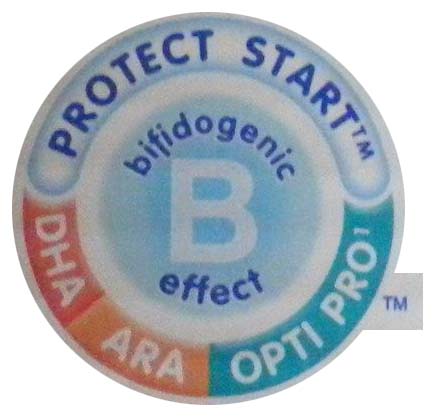Holding Nestlé to account
Nestlé attempts to defend its health claims...
“Improved breastfeeding practices and reduction of artificial feeding could save an estimated 1.5 million children a year”
According to the World Health Organisation:
“infants who are not breastfed in the first month of life may be as much as 25 times more likely to die than infants who are exclusively breastfed.”
 So how can Nestlé justify claiming on its labels that its formula ‘protects’ babies and has ‘new active immunity’?
So how can Nestlé justify claiming on its labels that its formula ‘protects’ babies and has ‘new active immunity’?
Below we give the defence provided by Nestlé’s Global Public Affairs Manager, Dr. Gayle Crozier-Willi, in a letter dated 2 November 2010, the latest in a long series. Dr. Crozier-Willi has also received thousands of emails from boycott supporters.
‘Gold Standard’ refers ‘to the Gold colour of the labels’
“The use of the term “Gold Standard” refers to the fact that this advanced formula is, in our view, the Gold Standard for formulas, in comparison to other less innovative infant formulas. The statement was made in product literature for the exclusive use of health care professionals and referred to the Gold colour of the labels. It was not in any sense meant to make a comparison with breast milk and the brochure was not available to mothers or to the general public. Yours is the only complaint that we have seen about this since the launch of the product, and in any case since that time, the brochure has been discontinued.”
‘Protect’ logo ‘is backed by scientific evidence’
“The ‘Protect’ logo is used on a new generation of sophisticated infant formula with a unique combination of specific strains of probiotics, long-chain polyunsaturated fatty acids, immune-nutrients and selected proteins. This unique combination has positive effects on the infant’s physiology and metabolism with other formula without these ingredients. However, we in no way suggest that the formula is equal to or superior to breastmilk.”
Are these claims of ‘positive effects’ true? See our crowdsourcing experiment to explore the 'research' that Nestlé cites.
 The ‘protect’ logo is shown here on a tin from the display in rural Malawi and appears in many other developing countries. No mention is made of comparison with other formulas.
The ‘protect’ logo is shown here on a tin from the display in rural Malawi and appears in many other developing countries. No mention is made of comparison with other formulas.
Article 9.2 of the International Code of Marketing of Breastmilk Substitutes states:
“Neither the container nor the label should have pictures of infants, nor should they have other pictures or text which may idealise the use of infant formula.” [emphasis added]
...but finally admits added LCPs have no benefit
The Cochrane Library has reviewed research on ingredients that Nestlé and other companies highlight such as DHA and ARA Long Chain Polyunsaturated Fatty Acids (LCPUFAs) and concluded:
“It has been suggested that low levels of long chain polyunsaturated fatty acids (LCPUFA) found in formula milk may contribute to lower IQ levels and vision skills in term infants. Some milk formulas with added LCPUFA are commercially available. This review found that feeding term infants with milk formula enriched with LCPUFA had no proven benefit regarding vision, cognition or physical growth.”
Similarly, Cochrane Library reviews have found no benefit from adding prebiotics and probiotics. Nestlé has finally acknowledged the Cochrane Library findings, but says: “we do not make any claim on product labels that contradicts the Cochrane Library’s reviews”.
How can basing the global marketing campaign around the added ingredients be reconciled with the acknowledgement that there is no proven benefit from adding them to formula, a totally different environment to breastmilk? Dr. Crozier-Willi sees no contradiction, stating:
“Our statement is that DHA and ARA are ‘two special fatty acids found in breast milk, which are important for your baby’s defence system, and contribute to the development of brain and vision.’”
So Nestlé’s defence is it is talking about the benefits of breastmilk, not its formula!
Crowdsourcing - your chance to unpick Nestlé’s argument
It is disingenuous for Nestlé to pretend it is not claiming benefits for its formula. Its materials and arguments need close scrutiny and we would like you to help. Click here for full details of Nestlé’s defence of its claims, dig into the research and give us your analysis.
Here’s an example of what to expect. In earlier correspondence about a ‘Brain Building Blocks’ claim Nestlé used about LCPs, Dr. Crozier-Willi referenced research to support it, without giving the title of the study. Perhaps because this was: “The role of polyunsaturated fatty acids in term and preterm infants and breastfeeding mothers.” This states: “many studies have demonstrated advantages of breastfeeding versus formula-feeding on subsequent cognitive and visual function.” Regarding the supposed benefits of adding LCPs to formula, the paper urges caution over studies suggesting some early effects: “Although one logically may assume that these early effects may have long-term effects, this assumption is not warranted by the available data.”
So the best study Nestlé could cite actually contradicts the theory that adding LCPs to formula brings benefits. After many letters - and thousands of emails from members of the public - it is welcome that Nestlé now accepts the Cochrane Library reviews and admits this. But it still refuses to remove the logos and stop the aggressive marketing. More pressure is clearly needed - click here to send an email to Nestlé.






